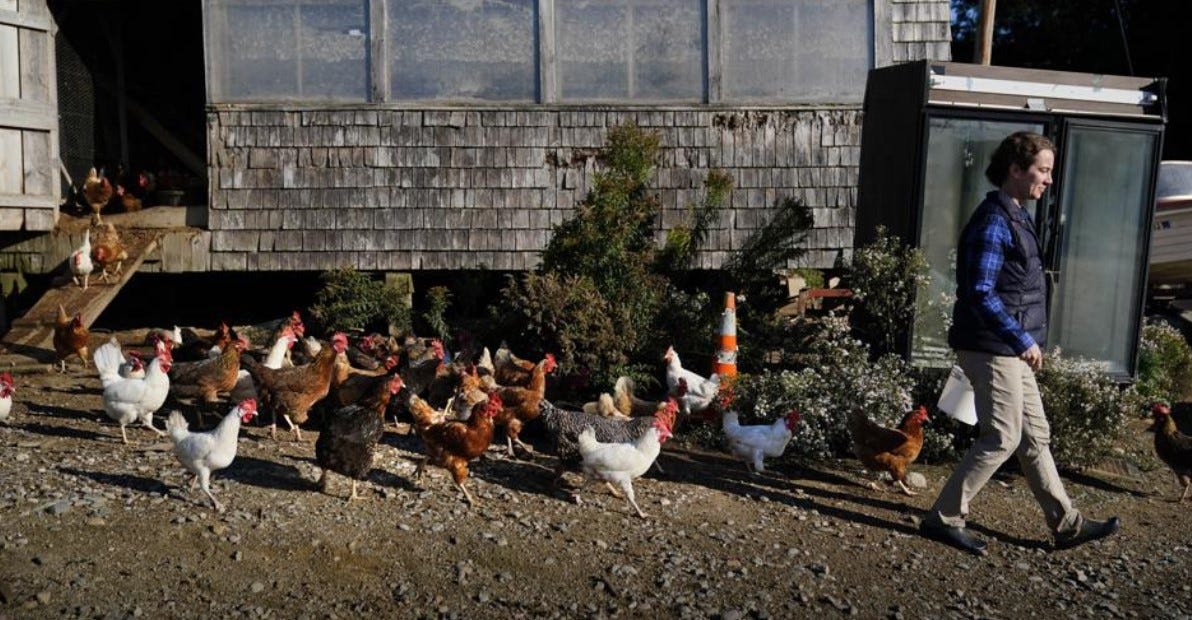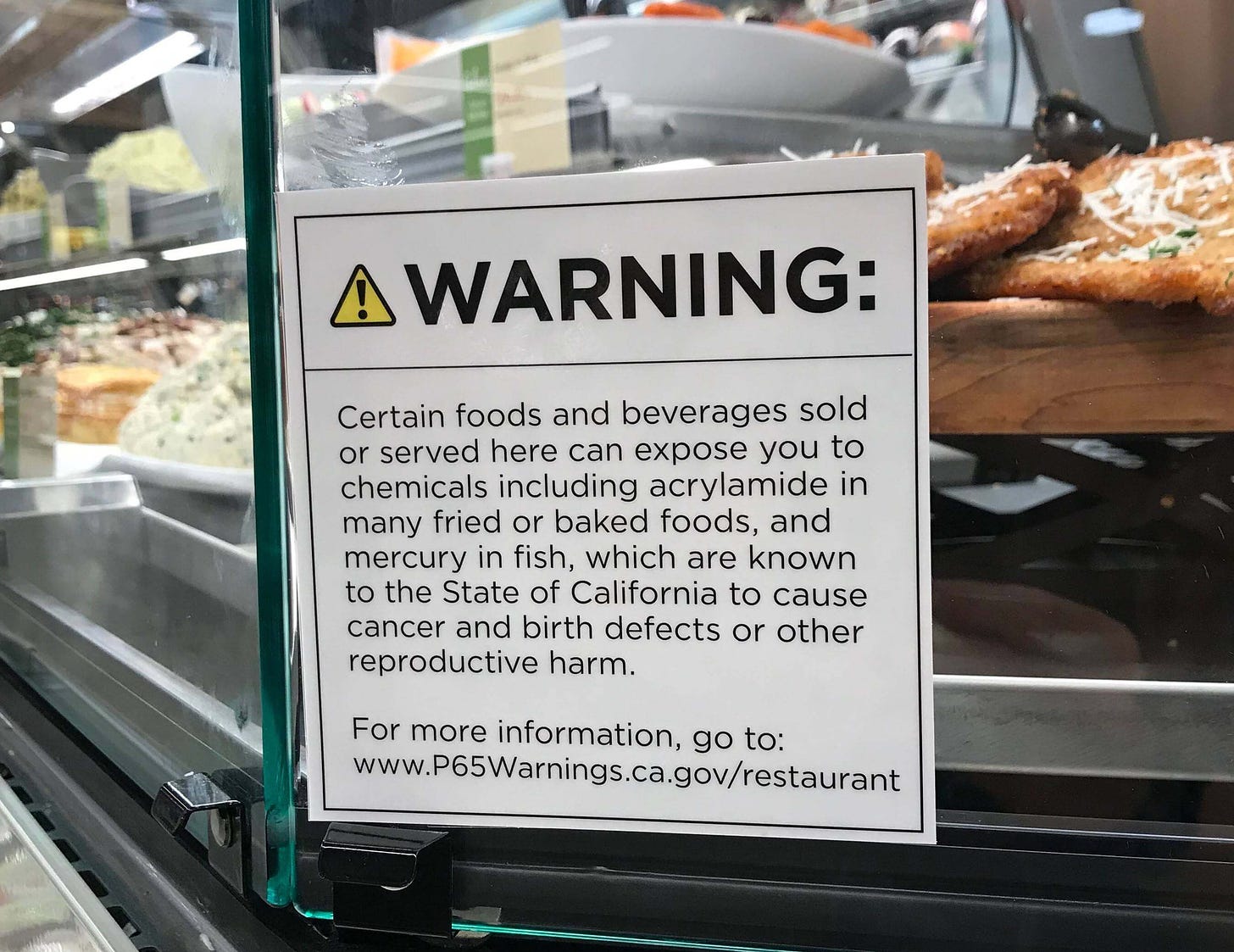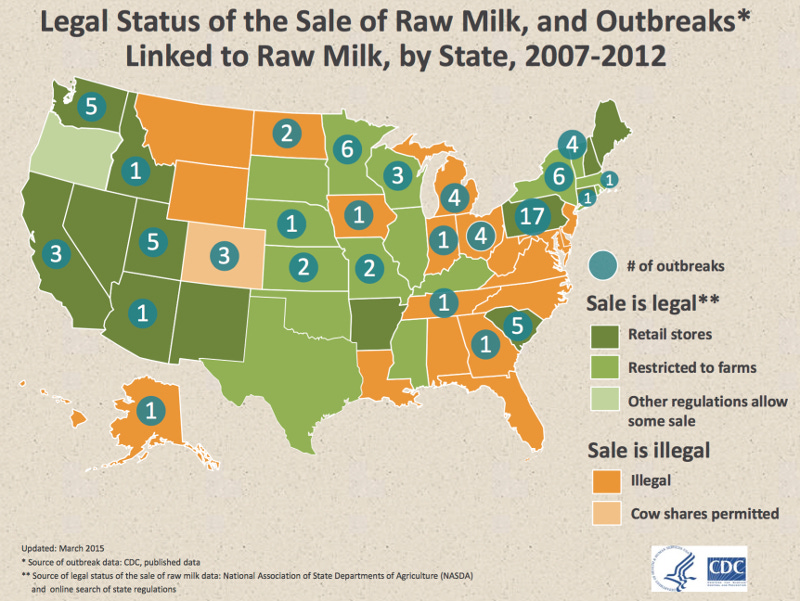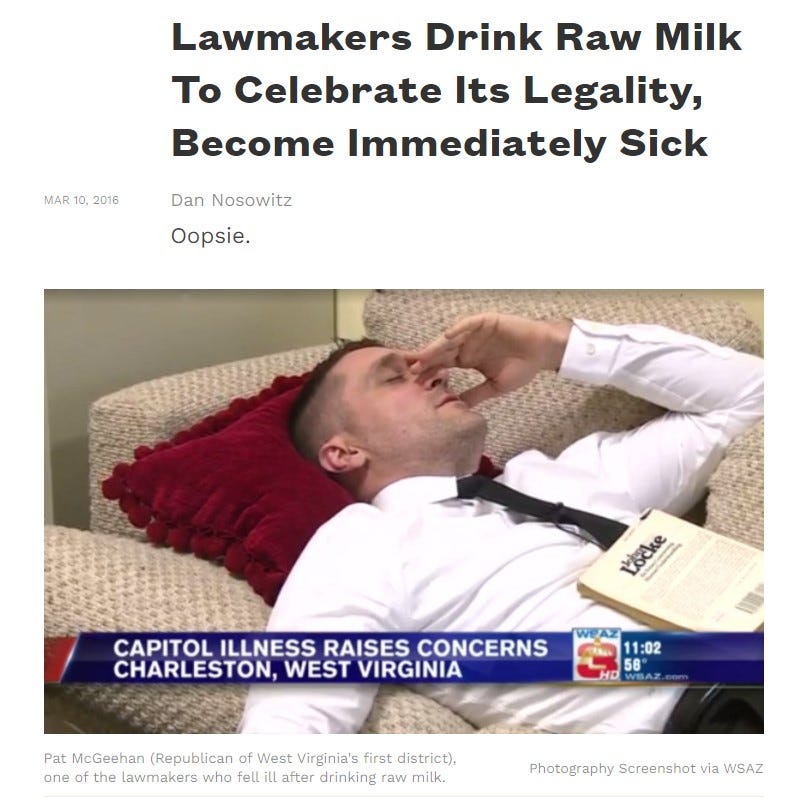Ricochet is the best place on the internet to discuss the issues of the day, either through commenting on posts or writing your own for our active and dynamic community in a fully moderated environment. In addition, the Ricochet Audio Network offers over 50 original podcasts with new episodes released every day.
 A Constitutional Right to … Food?
A Constitutional Right to … Food?
One of the more interesting ballot questions last Tuesday was Question 3 in Maine. The 43-word constitutional amendment, overwhelmingly approved by voters, reads as follows:
“All individuals have a natural, inherent and unalienable right to food, including the right to save and exchange seeds and the right to grow, raise, harvest, produce and consume food of their own choosing for their own nourishment, sustenance, bodily health and well-being, as long as an individual does not commit trespassing, theft, poaching or other abuses of private property rights, public lants, or natural resources in the harvesting, production or acquisition of food.”
It’s a little hard to figure out precisely what this means.
The coalitions supporting and opposing the initiative were bipartisan and unusual. Democratic legislators joined Republicans in support. Animal rights organizations joined the Maine Farm Bureau and Maine Potato Growers Council in opposition.
But no one seemed to care enough to invest much money in the campaign. A total of less than $8,000 was spent by both sides to influence the outcome.

Ballotpedia’s quote of Republican St. Rep. Billy Bob Falkingham, the author of the amendment, best explains its scope and purpose:
“Jumping ahead 25 or 50 years into the future, could we see our government creating roadblocks and restrictions to the people’s right to food? Will the government be telling people what they are allowed to eat and where they can grow it? Will Monsanto own all the seeds, and will we have gotten so far from our roots that we won’t even have natural seeds anymore? Will people even be allowed to grow gardens? Or will gardening become a luxury reserved for the rich? … Will we need it, 25, 33, or 50 years from now? If we wait until then to find out, it will be too late.”
Does that include federal patent and trademark laws since seed companies spend millions to engineer their seeds through hybridization or genetic manipulation to help farms produce more crops?
Faulkingham, a lobster fisherman by trade, is somehow worried that the government and corporations will prevent people from growing gardens, saving, and exchanging seeds. “There’s a lot of disturbing trends in the food category, with the power and control that corporations are taking over our food,” Faulkingham told Associated Press. That’s about as specific as the “right to food” gets. Good luck, judges and justices. I know of no food company plan to rid the nation of community or personal gardens.
Animal rights activists were opposed, fearful that Question 3 would open doors to animal cruelty.
Oh, sure, there is a long history of the “right to hunt and fish” and provisions in various state laws. Twenty-three states have such laws. A 24th, California (of course) grants a right to fish but not to hunt. Vermont was the first to constitutionalize it in 1777. Other states have or have contemplated “right to farm” provisions. But this is different, and courts will have to decide what it means and how far it goes.
And for food regulators and food makers, what other states will follow suit? And speaking of suits, how will the first lawsuits by farmers or others, using the law, look like, and against whom? I’m sure some enterprising food trial lawyers already have their thinking caps on, involving a sympathetic farmer and a food retailer with big pockets and lots of pricing power in the market, such as Walmart. So do others.
And that’s ultimately what this may be about. Follow the money.
While Maine has a long history of quirkiness on food issues, California is right there with them, from “anti-confinement” laws for pigs and chickens to requiring warning labels on foods that contain chemicals known to cause cancer or congenital disabilities, like alcohol. Proposition 65 warning labels are so ubiquitous in California that most people ignore them.

All this has emerged under various rubrics, such as “food sovereignty” or simply “the food movement.” Like all movements and revolutions, it has its patron saints and celebrities. It is motivated by farm-to-consumer relationships and access to “pure,” “fresh,” or “natural” food untainted by corporate middlemen, bigness, technology, and things like preservatives, flavorings, artificial fertilizers, colors, and other attributes found in many packaged foods. It reflects an emotional and romantic, if not religious, desire to connect more closely to food. They believe they taste better and are healthier for you, a matter of long-standing debate. These are the folks behind the explosion of farmers’ markets in urban/suburban settings over the past several years.
Food involves all our senses and connects us to special events in our lives. What significant life moments, at least the celebratory ones, don’t include food? Food issues are also sadly and tragically used as a weapon to scare people and raise money.
Convenience and price are often overlooked or ignored. And tragically, so is food safety.
There is no better example of that than the long-standing debate over raw milk consumption. While the US Food and Drug Administration outlaws the interstate sales of raw milk and the Centers for Disease Control warn against human consumption, it is legal in most states. Just 13 states outright prohibit retail or farm sales, although a couple allows you to access raw milk through “cow sharing” arrangements with farmers and fellow consumers.

And yes, raw milk consumption is dangerous. Let’s consult the Centers for Disease Control via foodsafetynews.com:
Based on statistics from the five-year period 2009-2014, people who drink unpasteurized, raw milk are 840 times more likely to contract a foodborne illness than those who drink pasteurized milk.
The statistics, included in a research report scheduled for publication in the upcoming June issue of “Emerging Infectious Diseases” also show raw milk drinkers are 45 times more likely to be hospitalized if they get sick than people who become ill from drinking pasteurized milk.
“Unpasteurized milk, consumed by only 3.2 percent of the (U.S.) population, and cheese, consumed by only 1.6 percent of the population, caused 96 percent of illnesses caused by contaminated dairy products,” according to the report scheduled for June publication by the Centers for Disease Control and Prevention.
And the raw milk industry might be the biggest winner in the “right to food” campaign.
Just in case you’re in doubt about the danger of raw milk, let’s consult members of the West Virginia legislature just after they celebrated the legalization of retail raw milk sales in 2016 in the state by drinking it. Maybe they should have stuck with champaign.

I get the philosophical argument, and I’m entirely aware of the emotion it engenders. I’ve been on the receiving end. It’s the same with motorcycle riders about wearing helmets, and many others: “my body, my choice.” Except your decision to consume raw milk might send you to a hospital, and if you don’t have insurance, and even if you do, the rest of us will be paying the bill through higher insurance rates or tax dollars through Medicare or Medicaid. Medical professionals, who are kind of busy right now, will be diverted. Sometimes, we have a responsibility to own the full consequences of our optional decisions. Please don’t make the rest of us pay for your stupidity.
Do you want to embrace libertarianism? Then go The Full Monty: your body, your choice, your expense.
This is one issue where Republicans can be just as stupid as Democrats. And if you think feeding raw milk to your children will help them, think again. You might as just as well introduce them to Russian Roulette. If you’re not familiar with that, this clip from the Academy Award-winning “Deer Hunter” from 1978 will show you how it works. I wouldn’t show this to young children. Or serve them raw milk.
While the CDC and FDA may have – well, did – screw up the messaging of COVID vaccines, they at least got this issue right.
No one person has done more for food safety than the legendary Dr. Louis Pasteur, who discovered that treating foods with heat for short periods destroyed bacteria and other pathogens that made people sick.
Take the canned food in your store. There is nothing safer, and few things more affordable. Corn, spinach, peas, and more are picked at the peak of freshness and, usually within four hours, are sorted, washed, fed into a can, sealed, and placed into a “retort” or spiral cooker that heats the products in the sealed can for a specified period. The process of canning preserves foods without chemicals. Cooking the product in the can kills harmful bacteria without destroying other beneficial characteristics. Yes, vitamin C, which is heat-sensitive, is lost in the “pasteurization” process. But most other things like fiber and other vitamins remain. And canning keeps it safe for a couple of years before the quality slowly starts to be lost. Frozen food has similar advantages over a shorter period. No such luck with fresh products, which have their place as well.
But canned foods are not “fashionable” for reasons that escape me. Canned foods are affordable and perhaps the most valuable entities of our food supply. Steel and aluminum cans are recyclable. Condensed soup, invented more than a century ago, was America’s first truly “sustainable” food. But they don’t appear “fresh” or “local” to “foodies.” The food world has lots of work to do on educating Americans on the safety and efficacy of our food supply. It is truly miraculous, even with today’s government-induced supply chain challenges.
Maine’s “Right to Food” amendment may start a trend, supported by raw milk apostles and others with unsubstantiated and false notions of food that move to other states. It’s a vague if not terrible law with potentially severe consequences. Don’t let it take root in your state, and let’s hope judges strike this down as vague and wholly unenforceable law and make it go away.
Published in General



Except, why would the OP be so against it? I suppose I shouldn’t be surprised. He’s not as obnoxious as others, but he leans establishment in some of his opinions.
I didn’t get that myself. But it’s a good post.
Phil – I stand corrected and thank you for clarifying:
The multinational, agricultural biotechnology corporation Monsanto developed the first widely used genetically modified crop in 1996 with the introduction of the “Roundup Ready” soybean. Farmers first used Roundup, a herbicide created by Monsanto in 1974, to kill weeds in their agricultural fields. The herbicide became Monsanto’s most important product. Shortly before Monsanto’s glyphosate (an active ingredient in Roundup) patent was to expire in 2000, the corporation managed to transplant it into the cells of soybean plants. This created a genetically modified crop that was resistant to the Roundup herbicide. Farmers were now able to spray the entirety of their fields with Roundup and only eliminate the unwanted weeds without harming the crops. More recently, Monsanto has spread this technology to include crops such as corn, canola, alfalfa, and cotton among others. However, farmers using Monsanto products nowadays face problems like the dependance on Monsanto crops and seeds, the large contamination with GMOs, and an increasingly developing resistance of weeds against glyphosates. Currently, there are ongoing debates about the corporation’s historic role in numerous pollution scenarios (PCBs [polychlorinated biphenyls] and chemical pesticides like DDT and Agent Orange) as well as about their endeavors to dominate the international seed market and to patent all kinds of life forms (biopiracy).
https://www.environmentandsociety.org/tools/keywords/roundup-ready-first-widely-used-genetically-modified-crop
This was the intro to “genetically-modified” seeds.
I ended up voting against it myself, not because I am not in favor of victory gardens and the freedom to eat weird stuff that you’ve grown yourself (my husband and I have been eating “volunteer” squash from the compost pile all summer—delicious!) but because I don’t really see why it needs to be a constitutional amendment. It seems like too complicated a question for that.
Was I wrong?
How many of them did it take to make a glass of juice?
In normal times, no. But today, I would feel ten or twenty percent better with a constitutional amendment. The fact seems to be that if the want to take away your garden, I doubt any constitution will matter.
So now they can’t take away your garden, but they can stop you from planting anything because you don’t have any right to the seeds.
I think all seeds can be bought, sold or traded.
Apparently Monsanto disagrees, and they have lawyers and maybe the government too.
I mean in the amendment.
Mrs. KCV and I were discussing victory gardens just the other day. We’re beginning to see them spring up in our area.
It seems to me that natural wind-borne hybridization is an act of God. Like if my tree is blown down on my neighbor’s car. As such, if Monsanto can’t control the pollen from plants produced from their seeds, they have no right to restrict the natural result of that consequence.
Anyone can order seeds – try Shumway
https://www.rhshumway.com/
Is there going to be the garden police? Are they going to climb fences to see what’s in the backyard? How about shimmying up balconies to see what’s in those pots?
I completely agree. Federal mandatory disclosure labels and symbols that look like warnings are a huge turnoff for both processors and food makers alike. I lobbied some 20 years ago to change them, to no avail. As a result, irradiation is limited to medical supplies and food packaging, where labeling/disclosure is not required.
I should have. As I mentioned elsewhere, I lobbied extensively 20 years ago to reform or remove the insidious “disclosure” labels required of foods that had been treated with irradiation to make them safer (like ground beef). Those disclosure labels turn off both food makers and consumers, thus we have no irradiated foods – just irradiated medical supplies and food packages that require no such disclosure. Shameful.
I doubt I would have voted for it either. It was worded to manipulate public opinion, not to present a clear choice between two alternatives.
The all-natural food movement harbors a great many truly extreme and obsessive people, as does the all-natural gardening movement. Most of their supporters are reasonable people, but these movements are being stirred up and energized by the handful of extremists inside them.
My mother said once that she was very surprised to see broccoli become so popular in the American kitchen. “We used to have to put it in the sink filled with cold water so the broccoli bugs would float up and we could get rid of them. No one liked doing that.”
We grow broccoli, and I’ve seen these bugs, which we now know how to avoid getting onto the plants in the first place. We use chemicals–I think the pesticide Seven or perhaps BT. (We’re just weekend gardeners, so I don’t remember which one, and my husband does the vegetables. :-) ) The major broccoli growers have other means such as starting with sterile soil.
My point is that people who have actually seen these bugs would never eat broccoli again. Which is a shame because it is really good for people. This is a victory for the agriculture industry. (Sterile soil is a bad thing, but the industry is working on a solution.)
The extremists don’t know what they are really asking for, and they push everyone’s buttons.
They lack a “larger purpose,” so to speak.
I am very frustrated with this group of people. They go off on tangents and don’t care who gets hurt. I’ve learned to tune them out, but they have a lot of followers.
If a homeowner has a patch of lush green grass, he or she is a very bad person. The homeowner is assumed to be using too much water, destroying natural habitat for the insects we are so fond of, and of course he or she is using too much fertilizer, weed suppressor or weed killer, and, worst of the worst, of course he or she is using pesticides that are killing us all.
I am a defender of lawns for a lot of reasons. They are the cheapest way to cool a house down, for one thing.
I was thinking of getting a bumper sticker made for my car that would read “I Love Grass.” Sadly, it would be misinterpreted. :-)
Remember that back at the beginning of the pandemic that some governments shutdown the ability to purchase seeds and to grow things. Michigan comes to mind as the worse offender with seed parts of stores being roped off.
Get real. They will use satellites, planes, helicopters and drones as well as imaging equipment that can tell what you are growing by light spectrums or heat signatures. Then you have the ability of combing though social media looking for offenders and then investigating on the ground.
Yes, planting your garden that spring was not essential. Our governor also tried to prevent paint sales. People forced to sit at home, looking at the same walls with no break, started going out and buying paint to freshen things up. She couldn’t stand for that. Freshly painted walls were not essential either, despite the fact that they might improve peoples dispositions.
Unfortunately that’s true.
They make “food” that can be machine harvested and trucked long distances. They also make plants that are resistant to glyphosate, which is really bad for seeds that are not resistant. This is high stakes and there have been deadly disputes between farmers over this.
One would think.
I think, rather, that the argument is that the government forces me to help you. And I don’t mind helping you but if you do something stupid, why should I be forced to help you.
Of course, this really an argument against social welfare, more than an argument about freedom.
Having a “right” to health care taken to the extent of forcing other people to pay for it, gives them an excuse to regulate what you do that increases their cost.
So, let’s say that you have a “right” to health care meaning that nobody can deny what you yourself pay for, but as with the 1st amendment giving freedom the press but you can’t force other people to buy you a publishing company, and the 2nd amendment right to keep and bear arms doesn’t mean the rest of us have to buy guns for you.
Question: if you buy some seeds from some seed company and grow the plants…do you have a right to then take the new seeds and plant those? I know the answer, but I wonder what you say.
Under “external” law, I don’t know what the current situation is supposed to be. But if, when buying the seeds, you have agreed to something like a software End User License Agreement (EULA) that you won’t do so, then maybe that’s on you, and you should have bought other seeds.
But I can be quite firm that no company has any basis for suing anyone for seeds they didn’t purchase, ending up on their property because of the wind or something. Maybe they should – if they haven’t already – include that in the EULA that the actual purchaser must follow because they bought the seeds: if any of them end up on someone else’s property, it’s the seed-purchaser’s obligation to correct it. If that means paying the other farmer to remove the “unauthorized” plants, or whatever. If that cuts into the buyer’s finances to the point that it’s no longer cost-effective to buy the patented seeds, fine. Everyone learns an important lesson.
Wickurd v. Filburn is the scourge of all america.
What was that famous supreme court case in which some guy growing food for his own consumption was deemed “participating in interstate commerce” and therefore subject to federal blah blah because he affected the market by not buying, something like that? I can hear Richard Epstein describing the thing in my mind’s ear.
My guess is that’s a background driver here. That *will* be part of any attack against this law if it goes to a federal contest.
Edit: DING! Yup, Wickard v Filburn! It used that farcical “participation” to claim that the Commerce Clause applied, and that the Feds therefore got to regulate this man carrying corn from his yard to his table.
It seems that many of the things we take to be…self evident…other don’t.